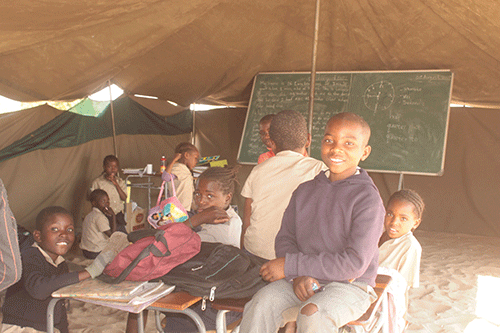RUNDU – Urban and rural development minister Erastus Uutoni on Monday ordered the Rundu Town Council to formalise the controversial Tumweneni area.
Tumweneni is on the outskirts of town and came to life through land grabbing in 2018.
The council secured a High Court eviction order, which the inhabitants ignored, and the population at the informal settlement has since grown.
At the moment, there is a makeshift government school, (Siguruguru Junior primary) which cannot receive permanent structures as it is also considered to be illegally occupying space at the disputed settlement.
The school is on unsurveyed and informal land.
The minister visited the area to assess the situation in which the school now finds itself.
Because of the dispute, over 700 learners are taught in tents. The school has no water or ablution services.
“We are talking about development. What are we developing if we have got a school like this one, my fellow leaders? I could see the big population here, and this is the population that we are expected to develop. Now, they are attending classes in tents. When are we going to do something?’’ Uutoni asked the Rundu councillors, including Kavango East governor Bonifatius Wakudumo.
“I am told people came here illegally, hence the eviction order. But I could see the population after I moved around here. I am not trying to do anything about the court (order), but I am talking about development and the population here. If you are going to evict, do you have land reserved where you are going to put these people? Because when you evict, you need to find space where you can allocate these people,” he reasoned.
Uutoni said if Namibia is talking about rural development, it includes the schools within rural areas where councillors are leaders and are expected to bring about development.
He thus advised the town and regional councils, the school and stakeholders, to establish a committee to find ways to resolve the matter before the end of this year.
The minister wants the land to be surveyed in order to accommodate the space that is to be gazetted for the construction of the school.
“My directive is that this place should be formalised as a matter of urgency, and the school can find its premises here. You can call a special council meeting and discuss when to develop this area,’’ he said.
“If the regional council has money, it can also be channelled into Tumweneni as it is also part of the region as the town also has urban, rural land. Engage stakeholders, and get money to survey this place after we have a layout,” he directed.
Uutoni further told the leadership that council, through the legal framework, can engage the line ministry for financial support, and then see how they can work it out.
“I want to see something happening here this year. Everything here should be formalised, and then we move forward,” he reiterated. The minister likewise urged councillors, although they are from different political parties, to put their differences aside and develop Tumweneni by bringing services closer to a large number of inhabitants there.
“If the councillors pass a resolution, we can do the work. There’s no difficulty in doing the technical part of getting a layout and surveying,” said John Sinime, a technical manager at the Rundu Town Council.
Rundu mayor Gabriel Kanyanga observed that there was no issue around it, and it can be achieved if it is on the agenda of the next council meeting.
“If we can just bring this issue to the next council meeting, there is no dispute here,” he added.
The school was established in 2019 as a makeshift school to cater for learners in the informal settlement, as it is located far from other schools.


